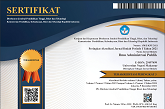Formulation of Smart City Policy Instruments (Study Jogja Smart Service Program in Yogyakarta City)
(1) Universitas Amikom Yogyakarta
(*) Corresponding Author
DOI: https://doi.org/10.26858/jiap.v10i2.13700
Abstract
This study aims to provide an overview of the formulation of policy instruments in improving public services of the Yogyakarta City. Therefore, this study describes the effectiveness that has been achieved and also describes the problems that arise in the Jogja Smart Service Program (JSS) in the context of the formulation of policy making. This can then be useful for developing alternative policy instruments that are similar. In the perspective of public administration, a program of policy can be seen part of the management of decisions in public policy, where the resources and actors are organized and coordinated. This gives consequences about how the process of making instrument formulation at the time of making the policy. Thus, it becomes interesting to see how the process of formulation of policies in the Jogja Smart Service Program (JSS). By using descriptive qualitative research methods, the stages of the method in this research are collecting data related to the policy formulation process of the Jogja Smart Service Program (JSS), in the form of interviews and documentation of regulations and related policies. The result of the research is the formulation of Jogja Smart Service (JSS) policies in Yogyakarta City which still has various challenges, so a combined instrument is needed, namely synergy and collaboration between the government, private sector, community and other stakeholders to support the effectiveness of the program.
Keywords
Full Text:
PDFReferences
Agustino, Leo. (2008). Dasar-dasar Kebijakan Publik. Bandung: Alfabeta.
Borsekova, K., Koróny, S., Vaňová, A., & Vitálišová, K. (2018). Functionality between the size and indicators of smart cities: A research challenge with policy implications. Cities, 78(January), 17–26. https://doi.org/10.1016/j.cities.2018.03.010
Caragliu, A., & Del Bo, C. F. (2019). Smart innovative cities: The impact of Smart City policies on urban innovation. Technological Forecasting and Social Change, 142(December 2017), 373–383. https://doi.org/10.1016/j.techfore.2018.07.022
Contreras, G., & Platania, F. (2019). Economic and policy uncertainty in climate change mitigation: The London Smart City case scenario. Technological Forecasting and Social Change, 142(June), 384–393. https://doi.org/10.1016/j.techfore.2018.07.018
Fromhold-Eisebith, M., & Eisebith, G. (2019). What can Smart City policies in emerging economies actually achieve? Conceptual considerations and empirical insights from India. World Development, 123, 104614. https://doi.org/10.1016/j.worlddev.2019.104614
Habibzadeh, H., Nussbaum, B. H., Anjomshoa, F., Kantarci, B., & Soyata, T. (2019). A survey on cybersecurity, data privacy, and policy issues in cyber-physical system deployments in smart cities. Sustainable Cities and Society, 50(June), 101660. https://doi.org/10.1016/j.scs.2019.101660
Howlett, Michael and M. Ramesh. (1995). Studying Public Policy: Policy Cycles and Policy Subsystem. Oxford: Oxford University Press.
Kumar, H., Singh, M. K., & Gupta, M. P. (2019). A policy framework for city eligibility analysis: TISM and fuzzy MICMAC-weighted approach to select a city for smart city transformation in India. Land Use Policy, 82(February 2018), 375–390. https://doi.org/10.1016/j.landusepol.2018.12.025
Lester, James P. and Joseph Stewart. (2000). Public Policy: An Evolutionary Approach. Australia: Wadworth.
Lu, H., de Jong, M., & ten Heuvelhof, E. (2018). Explaining the variety in smart eco city development in China-What policy network theory can teach us about overcoming barriers in implementation? Journal of Cleaner Production, 196(2018), 135–149. https://doi.org/10.1016/j.jclepro.2018.05.266
Nugroho, Riant. (2009). Public policy: teori kebijakan, analisis kebijakan, proses kebijakan, perumusan, implementasi, evaluasi, revisi, risk management dalam kebijakan publik, kebijakan sebagai the fifth estate, metode penelitian kebijakan. Jakarta: Elex Media Komputindo.
Praharaj, S., Han, J. H., & Hawken, S. (2018). Urban innovation through policy integration: Critical perspectives from 100 smart cities mission in India. City, Culture and Society, 12(June), 35–43. https://doi.org/10.1016/j.ccs.2017.06.004
Sukardi. (2003). Metodologi Penelitian Pendidikan Kompetensi dan Prakteknya. Jakarta: Bumi Aksara.
Sokolov, A., Veselitskaya, N., Carabias, V., & Yildirim, O. (2019). Scenario-based identification of key factors for smart cities development policies. Technological Forecasting and Social Change, 148(August), 119729. https://doi.org/10.1016/j.techfore.2019.119729
Soyata, T., Habibzadeh, H., Ekenna, C., Nussbaum, B., & Lozano, J. (2019). Smart city in crisis: Technology and policy concerns. Sustainable Cities and Society, 50(April), 101566. https://doi.org/10.1016/j.scs.2019.101566
Vu, K., & Hartley, K. (2018). Promoting smart cities in developing countries: Policy insights from Vietnam. Telecommunications Policy, 42(10), 845–859. https://doi.org/10.1016/j.telpol.2017.10.005
Article Metrics
Abstract view : 531 times | PDF view : 113 timesRefbacks
- There are currently no refbacks.
Copyright (c) 2021 Agustina Rahmawati

This work is licensed under a Creative Commons Attribution 4.0 International License.
Diterbitkan oleh:
Program Studi Ilmu Administrasi Publik
Program Pascasarjana Universitas Negeri Makassar
JIAP Index By:

This work is licensed under a Creative Commons Attribution 4.0 International License.









